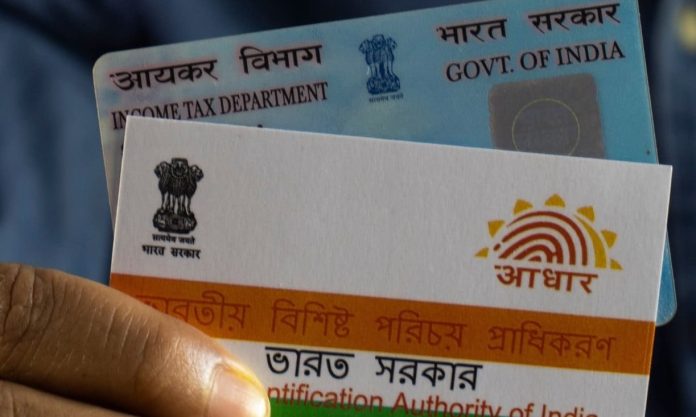


The Indian government has recently blocked access to certain websites that exposed personal details such as Aadhaar and PAN numbers. This move has sparked controversy and raised concerns about the security of personal information in India. The government has not provided a reason for the blockage, but it is believed to be in the interest of protecting citizens' data. Prime Minister Narendra Modi's administration has been pushing for the digitization of various services, but this incident has raised questions about the safety and privacy of such systems.
Blocking of Websites Exposing Personal Information in India: Implications and Concerns
The Indian government's recent decision to block access to websites that exposed personal details, including Aadhaar and PAN numbers, has sparked controversy and raised concerns about data security. This move has brought to the forefront the issue of balancing personal privacy and national security in the digital age.
Background
Aadhaar is a unique identification number assigned to Indian citizens. It has been promoted by the government as a means to streamline various services, including financial transactions, healthcare, and subsidies. However, concerns have been raised about the potential misuse of this sensitive data.
PAN (Permanent Account Number) is a 10-digit alphanumeric identifier issued by the Income Tax Department of India. It is used for tax-related transactions.
Government's Action
On April 8, 2023, the Ministry of Electronics and Information Technology (MeitY) issued an order blocking access to multiple websites that were alleged to be illegally disclosing Aadhaar and PAN numbers. The government's move followed a breach in a government database that exposed the personal information of millions of citizens.
Controversy and Concerns
The government's decision has sparked controversy. Privacy advocates have expressed concerns about the lack of due process and transparency in the blocking of websites. They argue that it sets a dangerous precedent and could lead to the censorship of legitimate information.
Furthermore, the blocking of websites has raised concerns about the security of personal information in India. The breach in the government database highlights the vulnerability of sensitive data and the need for stronger measures to protect it.
Top 5 FAQs
1. Why has the government blocked these websites? The government has not provided a specific reason for the blockage, but it is believed to be in the interest of protecting citizens' data.
2. Which websites have been blocked? Multiple websites have been blocked, including Online PAN India, PAN Card Status Verify, and Aadhaar Data Verify.
3. Can I still access my Aadhaar and PAN details? Yes, you can still access your Aadhaar and PAN details through official government websites or authorized channels.
4. What should I do if I suspect my personal information has been leaked? If you suspect that your personal information has been leaked, it is advisable to contact the UIDAI (Unique Identification Authority of India) or the Income Tax Department and report the incident.
5. What is the government doing to protect personal data? The government has recently introduced the Personal Data Protection Bill, which aims to provide a framework for protecting the personal data of Indian citizens. The bill is still under review.
Conclusion
The Indian government's blocking of websites exposing personal information has raised significant concerns about data security and privacy. It is crucial for the government to strike a balance between protecting citizens' data and ensuring freedom of information. The upcoming Personal Data Protection Bill is an important step in this direction, but its effective implementation will be key to safeguarding the privacy of Indian citizens in the digital age.

Realme has launched the highly anticipated Narzo 90 series in India, featuring two models boasting impressive features such as a massive 7,000mAh battery, 60W fast charging, and a 50MP main rear camera. These smartphones will be available for purchase starting December 24, with attractive offers including a Rs 2,000 bank offer for the Narzo 90x and a Rs 1,000 coupon for the Narzo 90. In addition, Realme has also launched the budget-friendly Realme P4x 5G, which offers the MediaTek Dimensity 7400 Ultra chipset and a 50-megapixel primary camera. Interested buyers can snag a Rs 500 coupon discount on all variants and a Rs 2,000 bank offer when purchasing on realme.com, Flipkart, or mainline stores.

The Indian Army showcased a range of homegrown technologies and capabilities at the Vijay Diwas celebrations in Delhi, highlighting the nation's steady transformation into a modern and innovative military force. From AI-based platforms to a portable drone analysis system, these solutions not only strengthen national security but also offer benefits for disaster response and infrastructure development. The event was attended by various dignitaries and underscored India's growing global defence engagement and confidence in its homegrown military technologies.

Motorola has launched their latest smartphone, the Edge 70, in India with a focus on design and user experience. The device boasts a sleek 5.99mm frame and a lightweight build, along with powerful AI features and upgrades to the operating system. With a competitive price of Rs 29,999 and a bank offer for additional savings, the Edge 70 is poised to entice buyers looking to upgrade their old phones.

Motorola has finally released its latest smartphone, the Edge 70, in the Indian market. With a thin form factor and advanced features like AI technology, improved camera, and fast charging capabilities, this device is a must-have for tech enthusiasts. Priced at Rs 29,999, it will be available for purchase in multiple color options and can be bought from Flipkart, Motorola.in, and offline stores.

Take advantage of a massive discount and upgrade your mobile computing experience with the Samsung Galaxy Book4. This sleek and powerful laptop offers a 15.6" Full HD Display, Intel Core 7 Processor, 16 GB Memory, and a 4 TB SSD – all at a fraction of the cost of similar models on the market. Its slim design, impressive hardware, and convenient ports make it perfect for all your work and entertainment needs, wherever you go. Don't miss out on this unbeatable deal on Amazon!

With the rollout of a major update for the Xbox app on Windows, Microsoft brings together multiple gaming platforms into a unified library, including Steam, Game Pass, and Battle.net. The new app also introduces Copilot, an AI-powered assistant available in beta on the mobile app, designed to enhance user engagement and provide support for in-game strategies, challenges, and tutorials. Along with these updates, Xbox console and cloud users will also enjoy improvements in customisation, access to game-specific stats, and easier transitions between devices.

The entertainment giant Disney has announced a $1bn equity investment in OpenAI, granting the startup permission to use over 200 beloved characters in its Sora video generation tool. While this partnership has the potential to revolutionize content creation, it also raises concerns about the impact of AI on jobs, creative ownership, and consent. Both companies are determined to find a balance between innovation and respecting creators' rights, which will be crucial in shaping the future of entertainment.

In a move towards more transparency and customisability, OpenAI CEO Sam Altman has announced the upcoming release of a new open-weight language model with reasoning capabilities. This marks the company's first major step in open AI development since the release of GPT-2 in 2019. With this move, OpenAI is venturing into a more competitive space and is seeking input from developers to make the model as useful as possible.

After previous failed attempts, SpaceX, led by CEO Elon Musk, launched its mega rocket Starship for the ninth time from its Starbase launch site in Texas. The spacecraft experienced a series of malfunctions, ultimately breaking apart and tumbling out of control, falling short of its main objectives. Despite this setback, Musk remains optimistic about the future launch schedule and plans for a faster pace with a Starship soaring every three to four weeks. NASA is relying on SpaceX to successfully develop the massive and powerful Starship in order to land astronauts back on the moon in the future.

At CES 2025, Dolby unveiled its latest developments in in-car entertainment with an expanded range of vehicles now offering Dolby Atmos support. Leading car manufacturers such as Cadillac, Mercedes-Benz, Rivian, and Volvo have incorporated Dolby's audio technology, with new announcements at CES, including a partnership with Sony Honda Mobility for its upcoming EV, Afeela 1. Dolby also showcased its collaboration with Analog Devices, MediaTek, NXP Semiconductors, and Texas Instruments, and Pioneer's demonstration of how Dolby Atmos can be delivered through aftermarket car audio products, providing consumers with new options to elevate their in-car entertainment experience.